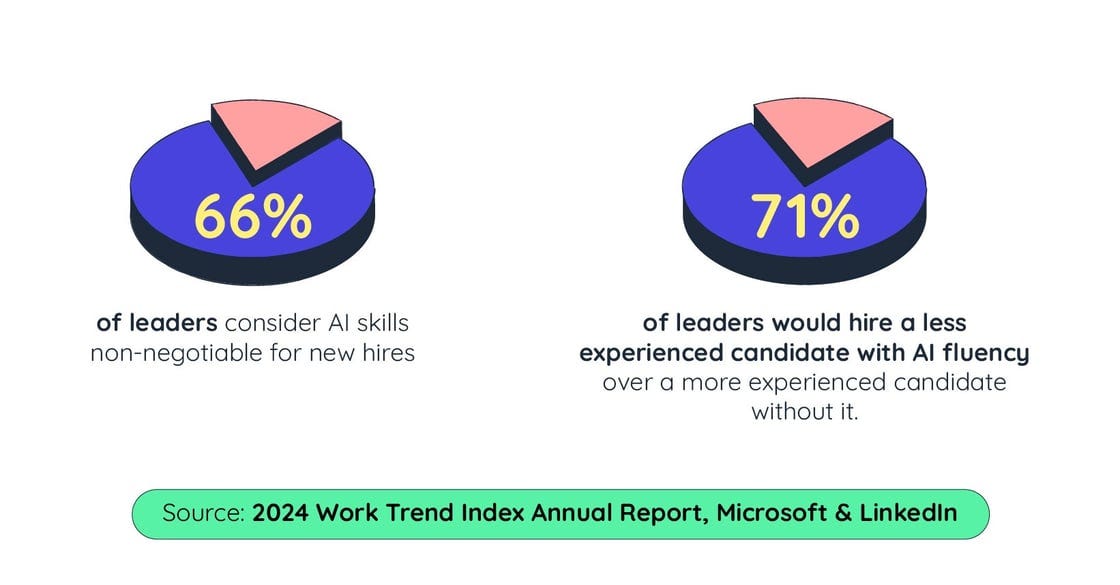AI will destroy your job. Here’s why that’s a good thing.
If there's one thing that has become brutally clear in 2025, it's this: devs can no longer afford to stand still.
Writing code, refactoring, debugging.
These were all core cogs of the developer’s workday.
For a long time, my north star was the “aha” moment. Even if it meant days of frustration, finally figuring out the root of a bug felt like a runner’s high. It made all the grind worth it.
But now, if you're still spending hours doing those same tasks manually, it's not a badge of honor.
I would actually consider it a warning sign. (And it might even be a job security risk).
Google’s CEO recently shared that over 25% of new code at Google is written by AI.1 That alone should be a wake-up call.
Efficiency isn’t optional anymore in a market defined by ongoing tech layoffs, hiring freezes, and mounting pressure to do more with less.
If you're not leveraging AI to work faster, smarter, and more strategically, someone else is... and leadership will notice.
The AI-fluent engineer
In hiring, AI fluency is becoming more important than years of experience.
A recent Microsoft report found that:
66% of leaders wouldn’t hire someone without AI skills
71% would rather hire a less experienced candidate with AI fluency than a senior developer without it.2
So… what exactly makes someone AI-fluent?
Here are just a few core skills:
Prompt Engineering: How to craft inputs that guide AI behavior effectively
AI Tools & Frameworks: LangChain, LlamaIndex, Hugging Face, etc.
Orchestration & Integration: Using tools like CrewAI and LangChain to coordinate LLMs, APIs, and agents into end-to-end solutions
AI fluency doesn't mean you need to be a full-blown AI specialist. It just means you know how to use AI to expand your capabilities (and stay on a path of continual upskilling).
Take web development for example. We've seen a steep decline of developers identifying as frontend devs since the rise of GPT. At the same time? A rise in hiring for full stack. With AI making it easier to work across the stack, full-stack generalists are becoming more desirable than niche specialists.
This trend applies across every domain of development: Use AI to do more across the board.
From cloud to mobile, every technological shift causes upheaval in tech. But AI is different. It affects everyone – regardless of specialization – and the stakes are higher than ever.
This isn’t just another tool shift. It’s a redefinition of what technical work looks like.
What counts as “real work” has changed (and here's the good part)
AI doesn’t eliminate what makes your job meaningful. It eliminates what makes it tedious.
Developers used to spend a good amount of time writing code, debugging, and researching. Incidentally, these are the top 3 tasks developers delegate to AI (according to the latest Stack Overflow survey).3
With handling boilerplate, test stubs, and doc updates, what’s left for you?
The fun stuff (at least in my opinion).
System Design. Creative solutions. Product thinking.
AI is giving developers more space to operate at the strategic layer—closer to the business problem, not just the implementation.
And this shift actually brings your work closer to the core purpose of software development: not obsessing over syntax, but solving problems.
AI can generate code, but it doesn’t know:
What problem to solve
Why it matters
How it fits into a bigger system
That part? That's still all you. And it's what still makes you indispensable in the AI era.
For junior developers, this shift toward automation opens doors that didn’t exist before. Historically, entry-level devs spent years on low-level tasks before being invited into System Design or architectural conversations. But with AI taking on that gruntwork, engineers now have the opportunity to get involved with these conversations earlier in their careers.
AI won't replace you. Devs who can use AI will.
The industry is moving on, with or without you.
Nobody gets grandfathered into the AI era. We all have to work on upskilling.
So ask yourself: How do you compete in a market where AI is already doing what you used to do? And equally important—what kinds of roles should you be targeting next?
Over the course of the next few weeks, I'll be sharing:
Where to look for jobs among tech layoffs
How to market yourself in today’s job market
Everything you need to learn to stay competitive in the AI era
How to get a step ahead with the next cutting-edge wave: AI agents
You can start your AI upskilling now with Educative's Generative AI resources, like:
Despite the turbulence, keeping up with AI is something you can control. There won't be a better time to start than right now. You can access all these AI courses and more at 50% off (or more) with Educative’s Shi{f}t Happens sale — valid until July 31.
Happy learning!
– Fahim




